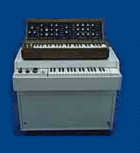






































|
Ange - Au Dela Du Delire
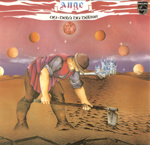
Click on the album cover to hear a RealAudio
sample.
Comments:
Ange play a style of progressive rock called "French theatrical". They seem to
have been influenced by Peter Gabriel-era Genesis and King Crimson. However, their sound is more French than British. If you can imagine walking by a university theater during rehearsals, somewhere in Paris, then you pretty much have an idea of their sound. Think theatrical music that comes off a bit rough, yet is absolutely charming. The French vocals are emotional, dynamic, and similar in style to Peter Gabriel. They are easy to enjoy and, if you understand some French, the lyrics are also humorous.
Their guitarist is impressive in a subtle sort of way. His style, which isn't technical at all, lies somewhere between Robert
Fripp and blues-rock. Anyway, this is one of the top albums from the French prog
scene.
Compositions: 9/10
Vocals(in French): 8/10
Recording Quality: 8/10
Cafeïne - Nouveaux Mondes
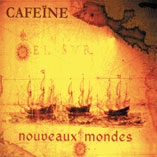
Comments:
Cafeïne is a relatively new 4-piece band, and their second album Nouveaux Mondes was recently released on the Musea label. This band plays what I would call "modern symphonic prog". The style of music here has similarities to bands like Cast, Discipline, and Finisterre. In the case of Cafeïne, they also bring in fusion influences, as well as influences from the 70s French prog scene(Ange, Mona Lisa, Atoll, etc). Nouveaux Mondes is quite a diverse album, and each track tends to explore new ground and atmospheres. Some examples include the first track "Hubble", which is an excellent sympho-jazz-fusion instrumental. A couple of the following tracks remind me a bit of Spock's Beard. The music, at times, tends to flirt with traditional verse/chorus/verse/chorus song structures. But the instrumental sections, and musical surprises along the way, tend to spice things up. The last few tracks, which sound more like a long epic, recall the classic days of Ange, Mona Lisa, and Atoll. I have to mention that although digital equipment is used throughout the CD, it is tastefully done. Those last few tracks really bring back those Ange, Mona Lisa, and Atoll atmospheres to mind. I almost forgot to mention that each vocal track(99.5% of the album is in French) on the CD features different guests from the French prog scene. Those guests include Christian Decamps(ANGE), Sonia Nedelec & Jean Baptiste Ferraci(MINIMUM VITAL), Cyril Grimaud(HAUTEVILLE), Pierre Yves Theurillat(GALAAD), & Julie Vander. Overall, Nouveaux Mondes will impress not only fans of modern prog bands like Cast, Finisterre, and Spock's Beard. But fans of the classic French prog era will find plenty to enjoy.
Website:
Cafeine
Email:
patrickjobard@aol.com
Carpe Diem - En Regardent Passer Le Temp

Comments:
I would recommend Carpe Diem to anyone interested in French progressive
rock. The tracks are a melodic feast of jazzy saxes, King Crimson-ish guitar, and
space-influenced keyboards. Most of the album is instrumental, but the short vocal-sections tend
to be influenced by the French theatrical-prog scene. En Regardant
Passer Le Temps is really impossible to describe because it is so original. Yet, you can expect music that colorfully dark, melodic, spacy, and bursting with passion.
Compositions: 10/10
Vocals(in French): 9/10
Recording Quality: 9/10
DÜN - Eros
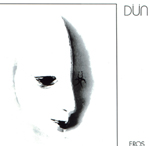
Comments:
Eros is an incredible album, and ranks as some of the
best prog to come out of France. DÜN's brand of prog
is complex, aggressive, and fast of ideas. It owes plenty to Zeuhl, but listeners
will find tons of Zappa, Indonesian gamelan, and fusion-jazz influences. The CD
consists of four 10-minute epics from the original album, and 4 bonus
tracks(3 of which are early live versions of album tracks). Some of the featured instruments include flutes, vibraphones, and synths. But, like most
Zeuhl music, the bass and drums play a very dominant role. The guitarist even adds a fusion sound to the compositions that is rather unique. Overall, Eros ranks right up there with Eskaton's 4 Vision.
Compositions: 10/10
Vocals(minimal): 9/10
Recording Quality: 9/10
Webpage:
Soleil
Eskaton - 4 Visions
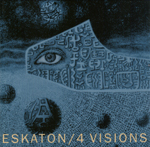 Click
on the album cover to hear a RealAudio sample.
Comments:
4 Visions is another masterpiece from the French scene. But this band doesn't play theatrical prog. Rather, Eskaton
were influenced by Zeuhl inventors, Magma. For those of you unfamiliar with Magma's sound, their music combined Wagner-esque grandeur with Eastern European rhythms and melodies, Germanic-like chanting(keep in mind that Magma sang in a made-up language), and almost ritual-like repetition(slowly building grooves to a frenzy). Unlike Magma, Eskaton
emphasized quick and furious theme development, and less repetition. They also sang in French rather than Kobaian. Eskaton consisted of a guitarist, bassist, keyboardist, drummer, and two female singers. The most impressive musicians in this band is the bassist. He is a monster on the instrument, and effortlessly spits out grooves that are fast, funky, and absolutely danceable(some part of your body will move to his grooves). The reissued CD consists of the 4 original tracks, and a bonus track. 4 Visions is one of the top Zeuhl albums out there.
Compositions: 10/10
Vocals(in French): 9/10
Recording Quality: 9/10
Serge Gainsbourg - Histoire De Melody Nelson
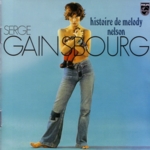
Comments:
Serge is best known in France as the "Dirty man of French pop music". His career dates back to the late 50s, when he began to write songs for some of France's best known pop singers. Thinking that his rough Eastern European looks and lack of voice wouldn't bring any sort of fame, Serge slowly got in show-biz only after receiving encouragement by several of his closest friends. With talent, a bit of schtick, and almost yearly publicity stunts Gainsbourg kept a 40 year career alive until his death in 1991. Gosh, I remember
seeing this guy on TV during my summer vacations in France. The combination of unfiltered cigarettes, lazy voice, unwashed hair, filthy shirts, and unshaven face didn't fit well with my brainwashed American ideals. Now as an older and wiser "mec", I can look back on the work of ol' Serge and appreciate his genius. Histoire De Melody Nelson is considered Serge's first concept album, and it's one of his most beloved albums. As bands like Pink Floyd and King Crimson were amazing kids across the channel, their influence, by 1970, started to infiltrate into French popular music. On Histoire De Melody Nelson Serge continues his well-known narrative, gutter-poetic, style while joining up with a rock band and small orchestra. The rock aspect of this album reminds me of something out of the krautrock scene. While Serge describes the story of an old man seducing, and de-virginizing, a teen girl, dissonant guitar/bass interaction shape out instantly likeable mid-tempo grooves. If Agitation Free stripped it down a bit, they might sound like a bit like the musicians on this LP. But as your ears relax to the heroin-mellow vocals, and dissonant chordal explorations from the guitarist, violins appear out of nowhere with notes that sound like something out of a Middle Eastern orchestra. Basically, the fusion of these three elements, the dissonant rock vamps, symphonic Middle Eastern-laced interludes, and Serge's vocals define this album. If you don't understand French, I'm sure Serge's lyrics will lose its brilliance, but the album can easily be enjoyed as psych-rock. When I see the terrible state of pop music around the world, and especially in the USA/UK, we really need more eccentric characters like Serge Gainsbourg to spice things up a bit.
Compositions: 10/10
Vocals(in French): 10/10
Recording Quality: 9/10
Serge Gainsbourg - L'Homme à Tête de Chou
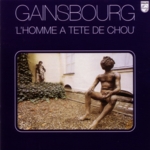
Comments:
L'homme à tête de chou is considered Serge's 2nd concept album. Many critics also claim that it's the best album he put out. Like Histoire de Melody Nelson, Serge's narrative tells the story(if I understood the story correctly) of a street-wise guy who falls for a girl named Marilou. As the story unfolds, the girl ends up being murdered by Serge's alcohol-fueled character. But this album is quite different both musically and lyrically when compared to Melody Nelson. Musically speaking, Serge explores reggae, African motifs, classical, 60s French pop, dark funk, and even country on the album's 12 tracks. The change in styles, from song to song, sounds a bit odd on first listen. But I must say that I ended up loving this idea after spinning the CD several times. The mix of styles gives each track an unpredictable quality that will impress most music fans. Yet, what really does it for me here is Serge's brand of street poetry. He pushes up the "cool" factor up several notches, and starts to effortlessly play with words like a master jazz-club poet. While the French lyrics will sound meaningless if you don't understand the language, like Histoire de Melody Nelson, Serge's voice can be taken in as an additional instrument. I listen to albums with narratives in Russian, Italian, and German all the time, and while I don't understand the lyrics, the lack of understanding doesn't take away from the overall experience. One of the best songs ever recorded is featured on Side B. "Variations sur Marilou" starts off a bit symphonic. But, all of the sudden the musicians lay down a super-cool mid-tempo country groove that features funky Moog bass. Serge fucking shines here on an emotional level. And after the 7 minute track ends, you wish that he could have kept the mood going for another 13 minutes. Overall, this brilliant album should be in every prog/experimental rock collection.
Compositions: 10/10
Vocals(in French): 10/10
Recording Quality: 9/10
Malicorne - Almanach
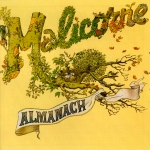
Comments:
A few years back, some of my family visited the Breton region of France. I casually mentioned to them to keep an eye out for the Breton band Malicorne, thinking that they would be impossible to find. But, as luck would have it, many of the older locals were still familiar with the band, and they quickly recommended Almanach as a perfect place to start. This 1976 album is not 100% "prog rock", but it is of interest to prog collectors who also enjoy European folk, acoustic Jethro Tull, The Pogues, and Gryphon(progressive folk in general). The music is 90% acoustic, and done using a combination of violin, viola, mandola, dulcimer, hurdy gurdy, krumhorn, and some percussion. The "electric" portion of the band consists of the bassist, Moog synth, some electric guitar, and an electric dulcimer. Overall, this is some beautiful music.
Compositions: 9/10
Vocals(in French): 9/10
Recording Quality: 9/10
Mona Lisa - Le Petit Violon De Mr. Gregoire

Click on the album cover to hear a RealAudio sample.
Comments:
Mona Lisa are very similar to Ange, in that they play in the
French-theatrical style. But, these guys seemed to have no intentions of just ripping-off Ange, so their sound comes off as original. In my opinion, the singer is much harder to digest than Christian
Decamps of Ange. He tends to get overly emotional, and over-acts
as he goes from one character to the other(like Peter Gabriel). Mona Lisa's
guitarist really stands out as someone with a unique sense for melody. Overall,
if you like symphonic prog then you really can't go wrong with Le Petit Violon De Mr Gregiore.
Compositions: 9/10
Vocals(in French): 8/10
Recording Quality: 8/10
Moving Gelatine Plate - The World of Genius Hans
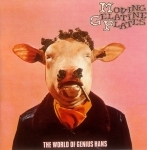
Comments:
Moving Gelatine Plates were one of France's most interesting groups. But, they didn't sound French at all. The musicians seemed quite inspired by progressive-jazz era Soft Machine, the Beatles, and Frank Zappa's post-1969 jazz compositions. They also added a healthy dose of RIO and klezmer that today recall bands on the Cuneiform label. The World of Genius Hans, the group's second album, was released in 1972. We find a band featuring horns(sax, alto sax, trombone, and trumpets), a guitarist, a bassist, and an incredibly busy drummer. The horn section really stands out here. Their sound combines the frantic jazz melodies of early Soft Machine with the complexity of a typical early Frank Zappa composition, and a noticeable klezmer influence. Somehow, the guitarist manages to create interesting melodies that don't follow the horn parts at all. The guitar playing is mostly jazzy, while at other times prog-like. The drummer plays with the energy of Italy's energetic drummers, and the jazzy touch of, say, Robert Wyatt. In all, you get compositions that are frantic, sometimes long, and unpredictable that feature theme, tempo changes, and odd-time signatures galore. There is also a noticeable psychedelic, and Beatle-esque influence during many sections. The album, of course, isn't perfect so I have to mention a couple flaws that might bother some of you. First, since it was popular in the 70s to include drum, bass, and guitar solos on LPs, this album has all of them. The bass solo, which is fortunately short, is thrown in the middle of one of the tracks, and is boring as hell. The guitar solo is part of one of the tracks. Actually the band plays along with the guitarist, but, man, does it ever border on noodling. I was strangely reminded of the boring, and unfocused, guitar solo on Eiliff's debut album. Now for the worse part! The band decided to place a 4-minute drum solo in the middle of one of their 15-minute tracks. Althought the drummer is quite good, I don't understand why the band let this guy solo for 4 friggin' minutes. I mean, 30-seconds would have been enough. Anyway, a word of warning(unless you're a drummer). Some tracks also feature English vocals. Most of them are pretty good(I would have never guessed that these guys are French), while others are silly(like the sped-up cartoon voice in the beginning). Fortunately, vocal sections are kept at a minimum. This CD also has a few bonus tracks from a 1980 album. Overall, they are okay but nothing to write home about. This CD will appeal to Eiliff, Supersister, Syrius, early Soft Machine, early Magma, and jazzy Frank Zappa fans. Most of the music is of the highest-quality, but keep in mind those stupid solos.
Year: 1972/1980
Compositions(from 1972): 9.5/10
Vocals(in English): 8/10
Recording Quality: 9/10
Pentacle - La Clef Des Songes
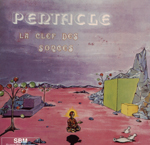
Comments:
After listening to La Clef Des Songes a few times, I rated it as one of the best albums from the seventies French prog scene. Pentacle were a 4-piece band influenced by bands like early King Crimson, and the Moody Blues. Their music tends to lean on the mellow symphonic sound, where beautifully colorful themes are led by acoustic/eletric guitar and analog keyboards. Every once in a while, the band starts to explore more aggressive territory(faster tempos, time-signatures, etc), and the guitarist bursts into passionate soloing. All of the tracks feature French vocals, which add to the beauty of the music. Fans of melodic bands like Carpe Diem are in for a treat with this little gem.
Compositions: 9/10
Vocals(in French): 9/10
Recording Quality: 9/10
Rahmann - Rahmann
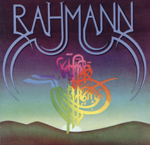
Comments:
Rahmann could be described as an Algerian version of Magma, without vocals, mixed with a some Mahavishnu influences. The rhythm section in this band is absolutely powerful. If you can imagine layers of percussion instruments playing around some powerful drumming(almost like the Middle-Eastern version of the percussion work on a Fela Kuti album) you will have some idea of their concept of rhythm. Add to that, complex guitar riffing(sometimes on Fretless guitar), aggressive Zeuhl-bass, dissonant keyboards, and you have the ingredients for some powerful music. The CD contains 6 tracks from the original album, as well as a few bonus live recordings of the same tracks. This is a must for fans of Area's Middle-Eastern/Greek influenced compositions.
Compositions: 10/10
Vocals(none): N/A
Recording Quality: 9/10
Shylock - Ile De Fievre
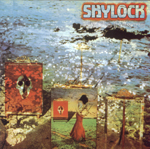
Comments:
I have never made up my mind whether Ile De Fievre was a great album, or not. It does have one of
the greatest prog songs ever written also entitled "Ile De Fievre".
But, after this monster, the album never quite recovers. Sure, "Ile De Fievre"
is worth $16, but it definitely goes by too quickly with its inspired playing influenced by Gentle Giant and King Crimson. The rest of the album is okay; In fact, most bands would love to have this material. But, compared to "Ile De Fievre", the
rest of the album is no match. Maybe the band should have put their monster composition as the
last song, rather than the first, so the album would build-up to an incredible climax. You
have been warned! :)
Compositions(overall): 8/10
Vocals(none): N/A
Recording Quality: 9/10
-
Terpandre - Terpandre
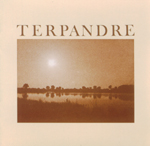
Comments:
Terpandre features beautiful, and mostly mellow, 70s symphonic prog. The band also liked to rock in a 70s jazz-fusion fashion, but they kept the album is on the delicate melodic side. Instruments like the violin, piano, and mellotron are given plenty of room to do their thing. Both of the
bonus tracks are live, and low in sound-quality. Overall, Terpandre offer a tasteful, and mature, style of prog that should appeal to most collectors. Don't expect anything complex, but if you are into melody then this band has plenty to offer.
Compositions: 9/10
Vocals(none): N/A
Recording Quality: 9/10
-
|
